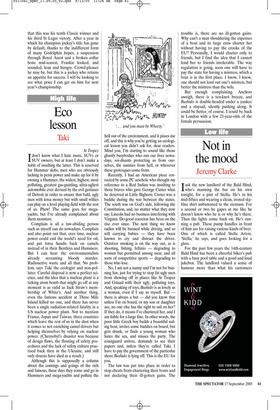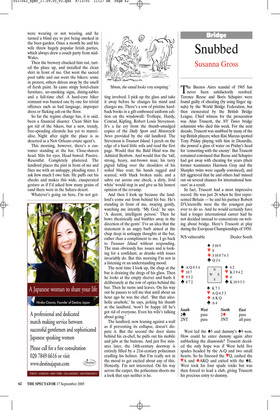Not in the mood
Jeremy Clarke
Iask the new landlord of the Bald Hind, who’s manning the bar on his own tonight, for a pint of Stella. He’s in his mid-fifties and wearing a clean, ironed skyblue shirt unbuttoned to the sternum. For a second or two he gapes at me like he doesn’t know who he is or why he’s there. Then the lights come back on. He’s running a pub. These pump handles in front of him are for raising various kinds of beer. One of which is called Stella Artois. ‘Stella,’ he says, and goes looking for a glass.
For the past few years the 14th-century Bald Hind has been a cheerful biker’s pub with a busy pool table and a good and loud jukebox. The landlord valued a sense of humour more than what his customers were wearing or not wearing, and he turned a blind eye to pot being smoked in the beer-garden. Once a month he and his wife threw hugely popular fetish parties, which always drew a coach party from midWales.
Then the brewery chucked him out, tarted the place up, and installed the clean shirt in front of me. Out went the sacred pool table and out went the bikers: some in protest, others driven away by the smell of fresh paint. In came stripy hotel-chain furniture, no-smoking signs, dining-tables and a full-time chef. A hard-core biker remnant was banned one by one for trivial offenses such as bad language, improper dress or flicking ash on the floor.
So far the regime change has, it is said, been a financial disaster. Clean Shirt has got rid of the bikers, but a new, trendy, free-spending clientele has yet to materialise. Night after night the place is as deserted as a New Orleans estate agent’s.
This morning, however, there’s a customer standing at the bar. Close-shaven head. Slits for eyes. Head bowed. Passive. Resentful. Completely plastered. The landlord places the pint in front of me and fixes me with an unhappy, pleading stare. I ask how much I owe him. He puffs out his cheeks and makes this wide, exasperated gesture as if I’d asked how many grains of sand there were in the Sahara desert.
Whatever’s going on here, I’m not get ting involved. I pick up the glass and take it away before he changes his mind and charges me. There’s a row of pristine hardback books in a gilt-embossed uniform edition on the windowsill: Trollope, Hardy, Conrad, Kipling, Robert Louis Stevenson. It’s a far cry from the thumb-smudged copies of the Daily Sport and Motorcycle News provided by the old landlord. The Stevenson is Treasure Island. I perch on the edge of a hard little sofa and read the first page. Would that the Bald Hind was the Admiral Benbow. And would that the ‘tall, strong, heavy, nut-brown man; his tarry pigtail falling over the shoulders of his soiled blue coat; his hands ragged and scarred, with black broken nails; and a sabre cut across one cheek, a dirty, livid white’ would step in and give us his honest opinion of the revamp.
And then I look up because the landlord’s come out from behind his bar. He’s standing in front of me, swaying gently, watching me intently. ‘My God,’ he says. ‘A decent, intelligent person.’ Then he bows theatrically and bimbles away in the direction of the gents’. I’ve an idea that the statement is an angry barb aimed at the chap deep in unhappy thoughts at the bar, rather than a compliment to me. I go back to Treasure Island without responding. The man obviously has issues and is looking for a confidant, as drunks with issues invariably do. But this morning I’m not in a listening or an understanding mood.
The next time I look up, the chap at the bar is draining the dregs of his glass. Then he looks at the empty sleever and hurls it deliberately at the row of optics behind the bar. Then he turns and leaves. On his way out he pauses to tell me that until about an hour ago he was the chef. ‘But that alcoholic arsehole,’ he says, jerking his thumb at the landlord, ‘won’t be happy till he’s got rid of everyone. Even his wife’s talking about going.’ The landlord, now leaning against a wall as if preventing its collapse, doesn’t dispute it. But the second the door slams behind his ex-chef, he pulls out his mobile and jabs at the buttons. And just five minutes later, the 14th-century doorway is entirely filled by a 21st-century policeman cradling his helmet. But I’m really not in the mood to get excited about any of this. Honestly. I’m not interested. On his way across the carpet, the policeman shoots me a look that says neither is he.




















































 Previous page
Previous page